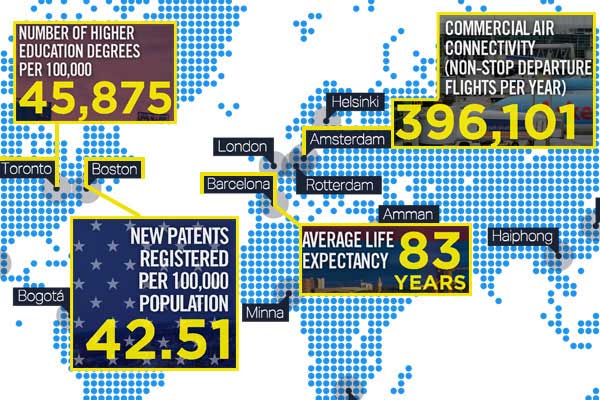
U of T's Patricia McCarney launches Open City Data Portal
Published: May 8, 2015
Hundreds of cities will now be able to compare themselves against other leading cities with the release of standardized data looking at everything from youth unemployment to energy consumption.
It’s all thanks to the World Council on City Data, a project with major international implications by University of Toronto Professor Patricia McCarney.
McCarney, director of U of T’s Global Cities Institute, compiled the data after developing an international standard for cities to collect and report data on 100 different indicators. That data until now was only available to the 20 cities that had participated in the project.
On Friday, at a National League of Cities event in California, McCarney unveiled an open data portal created by the World Council on City Data to urban leaders. The open data portal will now allow anyone from mayor and city planners to researchers, high school students and community groups to access the data and begin comparing cities and posing deeper questions like why some cities have a higher life expectancy.
It’s the world’s first open, online platform for globally standardized data on cities that’s been independently verified and is comparable, McCarney said.
“You really need to have good data to inform investment when dollars are scarce,” McCarney said. “From the city leaders’ perspective, they’re extremely interested in this because before you couldn’t really compare yourself to the rest of the world or even to other North American cities because the data was so uneven. It was all measured differently using different definitions, different metrics and data, and different boundaries.
“This will allow people to go deeper and ask: how did Barcelona get to have such a high life expectancy, how did Dubai become such an incredible magnet for commercial and real estate development?”
McCarney and her Global Cities Institute created the World Council on City Data to land the first set of international standards for sustainable cities called ISO 37120. Until then, cities were tracking statistics on different issues but using different methodologies and metrics.
Cities that have statistics on the open data portal include Los Angeles, Boston, Toronto, London, Barcelona, Dubai, Buenos Aires, Amsterdam, Bogota and Shanghai.
So far the portal has already revealed that, of the 20 global cities studied so far,Toronto ranks highest in innovation with nearly 46 per cent of people in the city having higher education degrees – while Barcelona ranks highest in life expectancy.
Next up, the group is busy signing on 80 new cities to the data portal. Those statistics for 100 cities will be gathered, studied and available online by 2016. The World Council on City Data is also creating partnerships with the United Nations Environment Program or UNEP, the United Nations Office for Disaster Risk Reduction or UNISDR, and several national governments.



